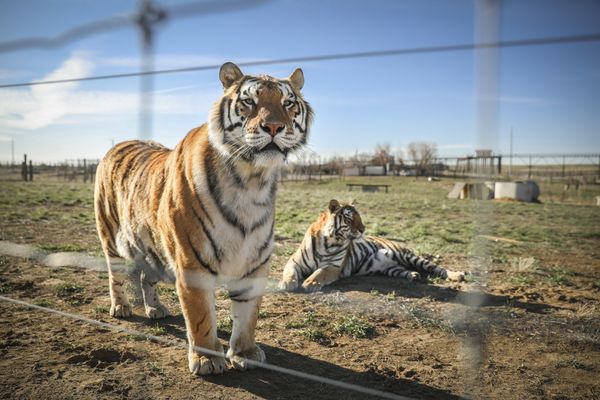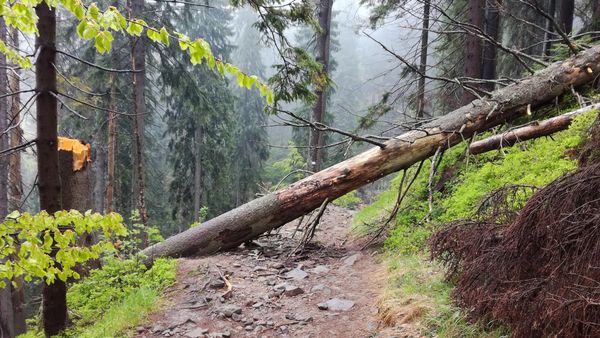Less than a lifetime ago, great flocks of Carnaby’s cockatoos cast large shadows over Perth. Now, the long-term clearing of eucalypt forests and banksia woodlands, combined with southern Western Australia’s driest and hottest period on record, is pushing the species towards extinction. Scientists say little is being done to reverse the decline.
Peter Mawson, a research associate at Western Australia’s biodiversity department, is old enough to remember a time when the birds were a common sight. “Sometimes, I see people make comments on social media that they’ve seen a flock of 100 Carnaby’s cockatoos and they’re really chuffed at that, because normally you see them in 10s or 20s,” he said. “But when I was a small boy collecting firewood with my father not far from where I grew up it was not uncommon to see flocks of 3,000 to 5,000 birds fly overhead.
“Most people I talk to have never seen a flock of that size, just because they’re not from my generation.”
Carnaby’s cockatoos are endemic to WA, living between Kalbarri on the mid-west coast and Cape Arid in the south. Black with distinctive white cheeks and tail bands, they live remarkably long lives – up to 35 years in the wild. Only a few birds, including shearwaters and albatrosses, live longer.
Because the species matures late, produces few young and has a low survival rate after first leaving the nest, its population fell quickly after old trees with deep hollows suitable for nesting were destroyed to accommodate farming and urban expansion in the decades after the 1950s. Invasive species and a bounty on the birds until 1982 to protect pine plantations hastened their decline. Numbers halved between 1963 and 2008 and the birds disappeared from a third of the area in which they were once found. Mawson estimates the population is now as low as 20,000.
The species’ health has weakened as warnings about the need to minimise threats from forest clearing, invasive species and the spread of timber plantations have largely been ignored.
New research says the climate crisis is increasingly having a significant impact on the birds. The study, published in the journal Pacific Conservation Biology in December, found that since 2009 the cockatoo has been put under more pressure as south-western WA experienced a more than 20% reduction in annual rainfall and greater variation in when the rain falls.
Mawson, one of the study’s authors, said changing rain patterns often pushed the species’ breeding period into a hotter part of the year. For example, instead of breeding and nesting being finished by December, chicks were in nests through January and February. This coincided with an increase in the number of extremely hot days at the height of summer.
“Once the ambient temperature reaches 35C outside it is too hot for the parents to fly around and gather food,” he said. “If you’re a nestling that’s meant to grow on two feeds a day but you’re only getting fed once, you either just don’t get out of the nest at all or you come out underdone – you’re smaller, you’re lighter.”
Mawson said new evidence showed the number of birds returning to a breeding ground at Coomallo Creek, between Perth and Geraldton, had been cut in half. The problem accelerated over the past 18 months, when Perth suffered through a record dry period, with no rain falling in summer and less than 40mm of rain hitting catchments between October 2023 and May 2024.
That resulted in a historic die-off of native bush around the WA capital and a slump in the amount of flower and fruit available for Carnaby’s cockatoos and other bird species.
Mandy Bamford, the Perth-based president of BirdLife Australia, said combined with continued clearing for urban expansion – much of it on a small-scale that does not require government approval for each individual development, but has a significant cumulative impact – the changing climate could lead to a further crash in the population.
“I’m very concerned,” she said. “I think we need to stop clearing and we need to start replanting and that is urgent.
“ [Perth] is the only part of the world where you have these enormous black cockatoos. People love them and I think the people of Perth do not want to lose them. But they occur in areas where people want houses and people want to mine for and develop aluminium, and then you have a conflict.
“And so it depends where your priorities sit – whether the birds stack up against all the other pressures. It’s difficult for governments but there are some hard decisions you sometimes have to make.”
Students and other volunteers have been doing their bit to ensure the bird’s survival – by building and installing artificial nests in suitable trees. The artificial tubes mimic natural tree hollows that could otherwise take up to 200 years to form.
Eva Czislowski has played an important role in that work. In 2021, when she was 16, she organised a program that led to about 60 fellow students at Shenton College volunteering to make tubes. Since finishing high school and starting to study social and environmental sustainability at the University of Western Australia, she and other volunteers with the charity Carnaby’s Crusaders have helped to provide shelter that has led to 19 chicks being born.
“People just volunteered to have these hollows installed on their properties,” she said, adding: “My generation is incredibly angry – we must hold politicians accountable, but we must also act, ourselves.”
Dean Arthurell, from Carnaby’s Crusaders, said artificial hollows were a “wonderful” innovation that could “bolster” the population, but warned: “If these birds don’t have enough habitat, it’s all pointless.”
BirdLife Australia and other groups encourage people in Perth to plant native species, including banksia and hakea – both important sources of food for black cockatoos.







